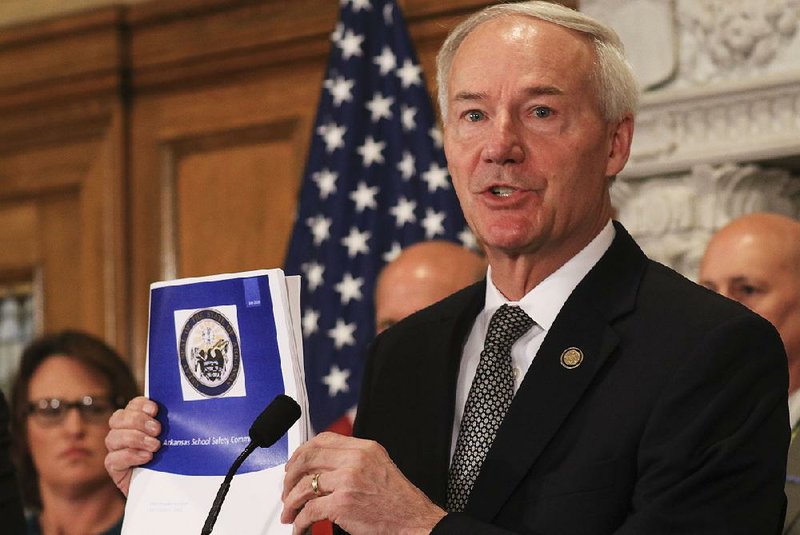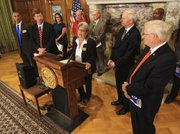School districts and law enforcement agencies will bear the brunt of costs to implement new school safety recommendations, Gov. Asa Hutchinson said Tuesday in a news conference.
The school safety commission Hutchinson formed in March after the mass shooting at Marjory Stoneman Douglas High School in Parkland, Fla., returned 19 preliminary recommendations Tuesday for best safety practices across the state.
Hutchinson said many of the recommendations will not require additional funding to implement, and the cost of hiring school resource officers or training school safety coordinators will fall primarily on school districts and law enforcement agencies.
"I think the additional resources you have to look at would be on the school resource officers," Hutchinson said. "That's a big one, school resource officers, and that has historically been shared by the school districts and local law enforcement."
"Some of the poorer districts," or districts that choose not to hire school resource officers, Hutchinson said, could instead commission school security officers -- volunteer school personnel who go through training in order to carry firearms -- and thus would incur few costs aside from the training.
"The school safety team will be comprised of existing school personnel," Hutchinson said. "Those don't require additional resources."
Eve Jorgensen, Arkansas' chapter leader of Moms Demand Action, said that simply increasing security won't deter school shootings.
"I don't think more guns in more places is the answer," said Jorgensen, who attended Tuesday's news conference. "I think they need to do more to prevent school shootings."
Jorgensen said she thinks the state should implement "red flag" legislation to allow law enforcement officials to confiscate guns from people deemed dangerous. Red flag laws have been passed in multiple states since the Parkland school shooting, including in Florida, Maryland, Massachusetts, New Jersey and Delaware.
The reliance on teachers to volunteer to be trained as commissioned school security officers, Jorgensen said, is a problem.
"I am concerned," she said, "that they're putting a lot of the responsibility for this on teachers who are underpaid and overworked anyway."
In March, Hutchinson allotted $300,000 to train armed school resource officers and develop safety plans. Those funds would not aid in training to commission school security officers.
Hutchinson said the other significant expenditure that districts implementing the safety procedures could incur is that of providing additional mental health services for students.
The FBI conducted a study on 63 recent active shooters and found that at least 25 percent of them had been diagnosed with mental illness at some point in their lives, The Associated Press reported this week.
Hutchinson's school safety commission recommended that student access to mental health services be increased across the state, that schools need a "toolbox" of resources to meet student needs and that counselors must spend more time actually engaging with students as opposed to overseeing testing or completing administrative tasks.
Hutchinson said after the news conference that there is no finite cost associated with implementing the mental health practices but he is "open" to the idea of the state providing some funds toward the effort.
"We will look at whether there are additional resources that need to be supplied from a state standpoint to aid in those services," he said.
Hutchinson said one of his primary goals for the mental health component is to pass legislation to put "teeth" in current law.
The Public School Student Services Act of 1991 requires counselors to spend at least 75 percent of their time providing direct counseling to students and no more than 25 percent of their time in administrative or other duties, but Hutchinson said the law is not being followed.
"Our school counselors are spending less time on the real counseling needs of the students and more time on administrative work and activities," he said.
School safety has been a national topic in recent months, particularly after shootings in high schools at Parkland and in Santa Fe, Texas.
State and national legislators have debated the best practices for school safety, from pre-emptively identifying troubled youths to increasing mental health resource availability.
The state committee's emphasis, however, was on putting armed security on campuses.
"No school," Hutchinson said, "should be without armed officers when staff or children are there."
Metro on 07/04/2018



